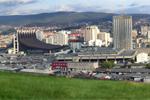Spring Trip to Kosovo for Students, Alumni and Friends
Wednesday, February 29, 2012
|
This course will examine the transition of Kosovo from its status as an autonomous province of Serbia within Yugoslavia to a subordinate part of Serbia after the dissolution of Yugoslavia to a ward of the UN to a newly independent country recognized by half the member states of the UN. Students will have the opportunity to consider the role of the UN and NATO in building institutions of governance in a vacuum, the difficulties of building a viable economy where none existed and the post-independence prospects of the world’s newest independent country.
On the ground in Kosovo we will meet with representatives of the international organizations and NGOs that continue to play a central role in shaping the society, senior officials of Kosovo, representatives of Serb and Albanian communities and political party leaders. This is a great opportunity for students, alumni and friends interested in economics, politics and international law to experience a first-hand demonstration of the reconstruction and stability of a foreign country. We will discuss the future prospects of Kosovo and the question of its future membership in the EU and NATO.
Students will visit cultural sites outside of Pristina, which may include Gracanica
Serbian Orthodox monastery, constructed on the ruins of a 13th century church and
a 6th century basilica; Kosovo Polje, where Slobodan Milošević was sent to calm a
crowd of protestors, when he famously told them that "No one has the right to beat
you ... No one will beat you ever;" Camp Film City, Pristina’s NATO Headquarters;
Prizren, the most culturally and ethnically heterogeneous municipality of Kosovo,
and Gjakova, a predominantly Albanian city, which suffered great physical destruction,
large-scale human losses and human rights abuses during the war.







